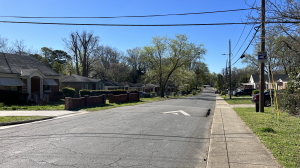Publications & Reports

By Fatima Rodriguez Caba
In 2019 and 2020, homicide rates within Charlotte rose by 45%.
This rise motivated the City of Charlotte to implement the Alternatives to Violence program within the Beatties Ford Road corridor. The corridor includes historical landmark neighborhoods and sites, Black-owned businesses and Johnson C. Smith University, Charlotte’s only historically Black college. While rich in community, history and culture, the corridor has borne the burden of historical discrimination and marginalization (e.g., redlining, predatory lending), resulting in a lack of socioeconomic development and resource investment– leading to disproportionately higher rates of poverty, crime and violence within the corridor […]

By Sydney Idzikowski
We are pleased to release the second annual State of Our Data report! The report provides the Charlotte Regional Data Trust Board of Directors, as well as our communities, partners and stakeholders with an annual update and summary of our community data ecosystem. The report also dives into the data we hold in trust and why it matters, and the work we do at the Charlotte Urban Institute and Regional Data Trust […]

By Sarah Ostyn
The research is clear: 90% of the brain develops before age 51.
Experiences that occur during this period set the stage for everything that is to come, making early childhood an exciting and significant time in our lives. Children – especially immigrant children and those in low-income households2 – who participate in high-quality early care and education, also known as ECE, have higher educational attainment, resulting in stronger communities and local economic growth […]

By Asha Ellison
What happens to the community needs of an existing population when out-of-town movers relocate to their city? Do they dry up like raisins in the sun?
Not exactly, but the resources existing residents need to thrive, and the amenities they desire, could be reprioritized if they aren’t equally shared – or aligned – with those of newcomers.
A recent study conducted by Elizabeth Delmelle, Ph.D., director of the Master of Urban Spatial Analytics at the University of Pennsylvania (formerly at UNC Charlotte), Isabelle Nilsson, Ph.D., director of the Ph.D. program in geography at UNC Charlotte, and Providence Adu, a doctoral candidate at UNC Charlotte and Graduate Research Assistant at the Institute, examined the housing and neighborhood choices made by out-of-town movers (those who relocated from more than 200 miles away). They found that, in Charlotte and other fast-growing cities during the COVID-19 pandemic, the neighborhood housing preferences of area newcomers, and the unequal demand for resources and amenities in the areas where they settled, may have adverse effects on community needs […]

In 2019 and 2020, Charlotte, like many cities across the United States, experienced increased rates of firearm-related violence. Rate of violence in Charlotte’s rose by 45% across those two years. In 2021, the City of Charlotte, Mecklenburg County, and Youth Advocate Programs began implementation of the Alternatives to Violence (ATV) Program in the Beatties Ford […]

Today, May 4th, Mecklenburg County Community Support Services released the Homelessness Among the Incarcerated Population Integrated Data Report, authored by the Charlotte Urban Institute. This report examines the rate of and risk factors for homelessness among those experiencing incarceration in Mecklenburg County detention centers. This report is part of the Housing Instability & Homelessness Integrated […]

On February 27, 2023, the UNC Charlotte Urban Institute and Town of Matthews shared findings from the 2022 Matthews Housing Needs Assessment. The study report includes findings about demographics, housing, land use, and key informant perspectives related to Matthews’ housing. The report also offers recommendations for advancing affordable housing as the population in Matthews continues […]

As a community, we often talk about the young people who are the “most vulnerable” or who are at “high risk.” Admittedly, we don’t always know who exactly those young people are and what their experiences have been. And far too often, those labels become the only story we associate with them. We don’t always […]

When it comes to the creative scene, Charlotte isn’t often mentioned in the same breath with peer cities like Austin or Nashville. After all, the city’s unofficial tagline is “Banktown,” not something like “Music City” or “Keep Austin Weird.” But Charlotte has a thriving creative community. And a new survey by the UNC Charlotte Urban […]

A new study of online rental housing advertisements in Charlotte found that corporate landlords are more likely to include potentially exclusionary language in their listings, and those listings are largely concentrated in minority communities. That’s one of the key results from a study by UNC Charlotte scholars Providence Adu, a PhD Student in the Department […]

In 2020, Lookout Housing Ventures proposed a redevelopment plan for Brookhill Village, a 36-acre naturally occurring affordable housing development near the intersection of Remount Road and South Boulevard. Although the proposed development has not moved forward, the approximately 120 households of Brookhill Village may be at risk of displacement if Brookhill Village were to be […]

In small towns across North Carolina, churches function as more than places of fellowship and gathering for people — they’re also de facto economic engines. [Read the full report: ‘The Economic Halo Effect’] That’s one of the key findings of a new research report by the UNC Charlotte Urban Institute, in partnership with The Duke […]